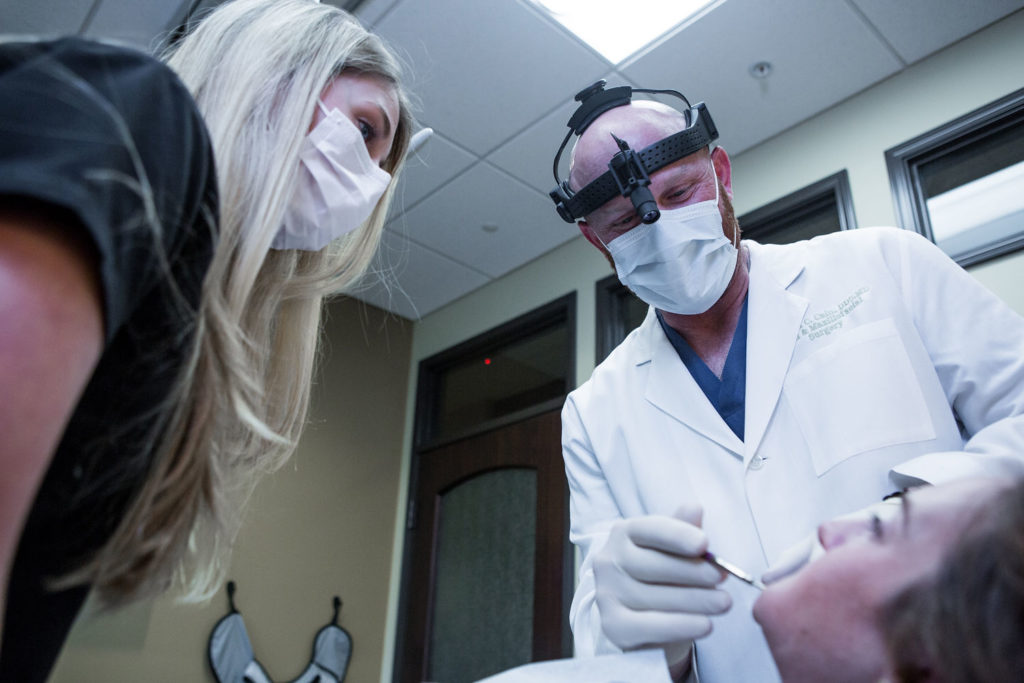Sponsored Content brought to you by Austin Oral Surgery
What is a dental implant?
A dental implant is a device made of titanium or ceramic alloy that is placed where a tooth or teeth used to be, sometimes at the same time as a tooth is removed. It will essentially function as a tooth root, and at some point a prosthetic device, such as a crown or bridgework, is fabricated and attached to the implant or implants to restore the function and esthetics of the natural teeth. The current style implant, which is shaped similarly to a tooth root, has been in use for over 40 years, so there is a strong track record of success.

What is the age range for dental implants?
In a growing patient, the position of the natural teeth is changing as growth continues. If implants are placed before growth is complete, their position relative to the natural teeth may change as well as leaving them poorly positioned. For this reason, implant placement is deferred until jaw growth is complete, typically around age 18.
There is no upper age limit for implant placement, and success rates are similar for all age groups.
How many dental implants can I get? Can I replace all my teeth with dental implants?
While one could replace every tooth with an implant, more commonly the design of the replacement teeth may use implants with multiple teeth supported. This is similar in concept to bridges resting on natural teeth and can be a more efficient use of fewer implants.
How long do dental implants last?
In the great majority of even young patients, most implants will last the life of the patient.
Does insurance cover dental implants?
While every insurance plan is unique, many plans do provide coverage for dental implants.
How long is the recovery?
There is a broad spectrum of procedural complexity when placing implants, from an individual tooth replacement to replacing all of the upper and lower teeth. When a single or even several teeth are replaced, the procedure is quick with very minimal recovery. Most patients could expect to go back to work the next day and have some slight modifications to their diet for a brief time.
When full arches are done, the procedure is more time-consuming and recovery will take longer. It would be rare, even in complex cases, for recovery to extend beyond a week. Your surgeon can give you personalized advice on what to expect with recovery.
Do I leave with a tooth that day?
With a full arch restoration, such as the widely advertised “All-on-4” solution, once the teeth are removed and the implants placed, an immediate temporary restoration is placed. This is sometimes advertised as “teeth in a day” and specifically refers to that process of replacing all of the teeth in either the upper or lower arch with that technique. In these cases the patient will indeed get immediately restored.
When dealing with a single tooth or fewer than all the teeth, most surgeons will want to defer tooth/crown placement to enhance healing and ensure implant success. In some cases, some anterior (front) implants may have a temporary tooth placed immediately. This is a process to discuss with your surgeon to understand more fully.
Can implants help with dentures?
While many patients are tolerant of a complete upper denture, assuming they can live with the roof of the mouth being covered in plastic, most are unsatisfied with their lowers. This is due to mobility and functional issues with lower dentures. For those who want reliable function and retention and/or want to eliminate the coverage of the palate, adding implants under the denture makes a world of difference. The volume of the denture can be streamlined, and it can be removed for easy cleaning yet retained in place with excellent stability.
Why should I choose an oral surgeon to place dental implants?
As a specialty, surgeons started the implant revolution 40 years ago and have been at the forefront of innovation and progress ever since. While technically any dentist may place implants, oral surgeons have four to six years of additional specialty training in surgical and implant care. Implant patients may need more than just the implant, and additional procedures, such as bone grafting or soft tissue (gum) refinement, may be necessary to get an ideal result. These procedures are rarely part of the training for generalists but are a routine part of implant care for your surgeon. Oral surgeons will typically place hundreds of implants each year, gaining experience and expertise along the way.
Visit austinoralsurgery.com to schedule a consultation.


